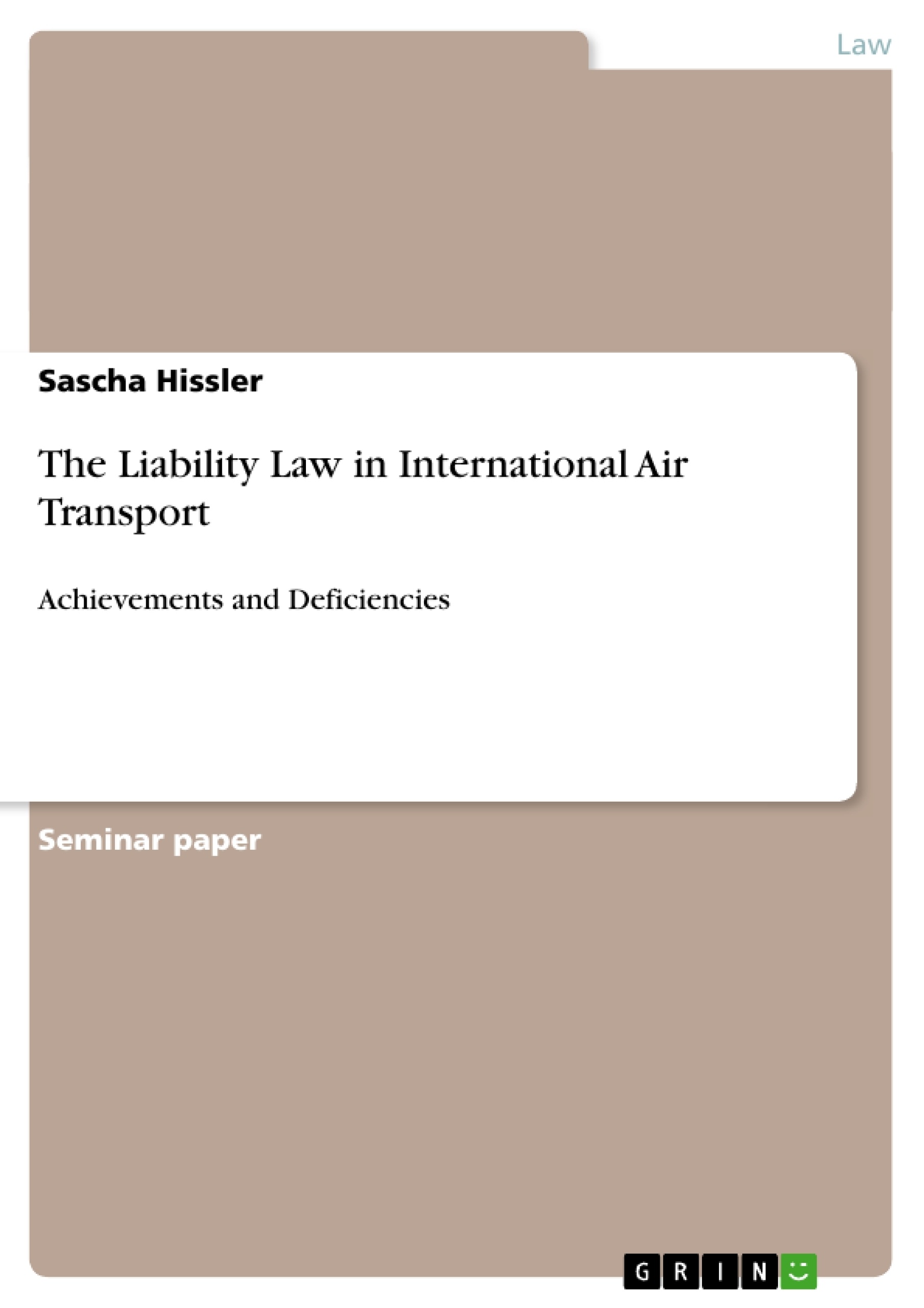Excerpt
Contents
Abbreviations
Introduction
History
The Warsaw System
The Montreal Convention
Achievements
Deficiencies
Conclusion
Literature
Internet-Sources
Abbreviations
illustration not visible in this excerpt
Introduction
Law in general is subdivided in two parts: in public law and in private law. Public law governs the relationship between individuals and the states whereas private law regulates the relationship between individuals.
When it comes to the laws ruling the aviation world, we also have to divide into these two parts: the public international air law represented in general by the Chicago Convention (formally „The Convention on International Civil Aviation“ done at Chicago on 7 December 1944) and on the other side the private international air law, mainly represented through the Montreal Convention (formally „Convention for the Uni Fi cation of Certain Rules for the International Carriage by Air“). The latter represents the liability law in international air transport, regulating the relationship between an air carrier and its customer, passenger, consignor or cargo shipper. It is supposed to replace the Warsaw Convention of 1929 which sets compensation levels for victims of air accidents, as well as liability for damage, delay or loss of baggage and cargo.
This paper describes Fi rst the historical way the Convention developed from Warsaw to Montreal and then goes into detail of the Montreal Convention with its achievements and de Fi ciencies. By quoting from the original, it is written very close to the wording of the Convention, emphasizing the parallels and differences of the Warsaw and the Montreal Convention.
History
The way to the Montreal Convention was paved by the Warsaw System, which is the second but older major legal instrument of private international air law. A generally accepted de Fi nition of this law ruling the aviation world reads as follows:
„Air Law is a body of rules governing the use of airspace and its bene Fi ts for aviation, the general public and the nations of the world.“[1]
The Warsaw System itself is based on a whole set of rules and regulations which are all arising from the Warsaw Convention of the year 1929. This „Convention for the Uni Fi cation of Certain Rules Relating to International Carriage by Air“[2] dated on the 2nd of October 1929 in Warsaw, established Fi rstly the principle of the air carriers‘ liability for damage caused to passengers, baggage and good as well as for damage caused by delay. These rules of liability are being applied all over the world and guarantee a certain degree of uniformity to passengers who board an aircraft - which is one of the main benefits of the Convention.
Due to the expand of the aviation world in general and a sky which was conquered by more and more aircraft, the Warsaw Convention had to be added and amended during the decades and became the Warsaw System including the following amendments, conventions and protocols.
The Warsaw System
1. „Protocol to Amend the Convention for the Unification of Certain Rules Relating to International Carriage by Air“[3], known as The Hague Protocol of 1955 - but entered into force after ratification by the 30th country in 1963. The main difference brought to the Warsaw Convention relating to carriage by air of goods and passengers is the increase of the carriers‘ revised liability from US $ 8,300 to US $ 16,600. Next to some technical changes other major issues on which The Hague Protocol differs from the original Warsaw Convention include the exclusion of the carriers‘ defenses of negligent pilotage and negligence in the handling of the aircraft. Furthermore, the burden of proof needed to exclude the limited liability of the carrier is modified from "willful misconduct" to "intention to cause damage or to cause damage recklessly and with knowledge that damage would probably result." (Article XIII)
2. „Convention Supplementary to the Warsaw Convention for the Unification of Certain Rules Relating to International Carriage by Air Performed by a Person other than the Contracting Carrier“[4], known as the Guadalajara Convention of 1961. This supplement formulates rules relating to international carriage by air performed by a person who is not a party to the Warsaw Convention, named chartering.
3. The Guatemala Protocol of 1971,[5] which is still not in force, because it is only ratified by seven instead of 30 states, which are required for the ratification and subject to certain conditions.[6]
[...]
[1] Diederiks-Verschoor: An Introduction to Air Law, 8th edition, Utrecht 2006, page 1.
[2] Wording of law: http://www.jus.uio.no/lm/air.carriage.warsaw.convention.1929/doc.html
[3] Wording of law: http://www.jus.uio.no/lm/air.carriage.warsaw.convention.hague.protocol.1955/toc.html
[4] Wording of law: http://www.icao.int/icao/en/leb/guadalajara.pdf
[5] Wording of law: http://www.dot.gov/ost/ogc/Guatemala1971.pdf
[6] See Internet http://www.luftrecht-online.de/regelwerke/intlaw.htm
- Quote paper
- Diplom-Staatswissenschaftler (univ.) Sascha Hissler (Author), 2009, The Liability Law in International Air Transport, Munich, GRIN Verlag, https://www.grin.com/document/132887
Publish now - it's free






















Comments